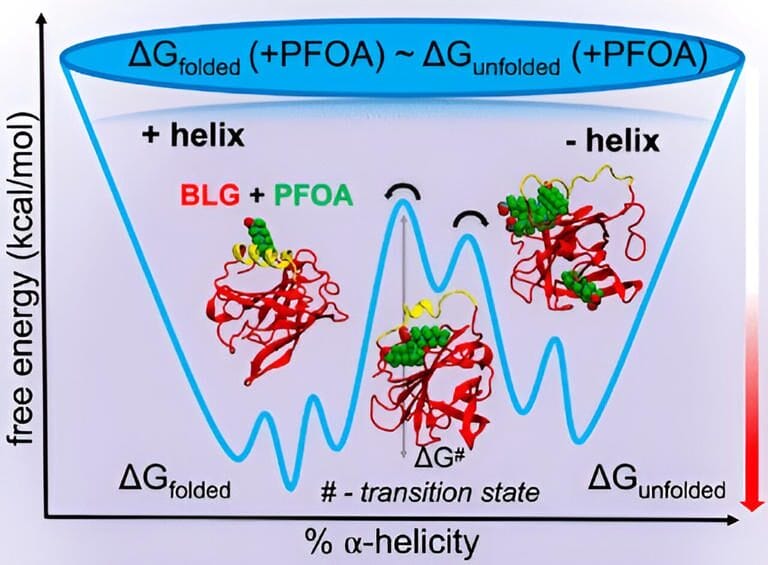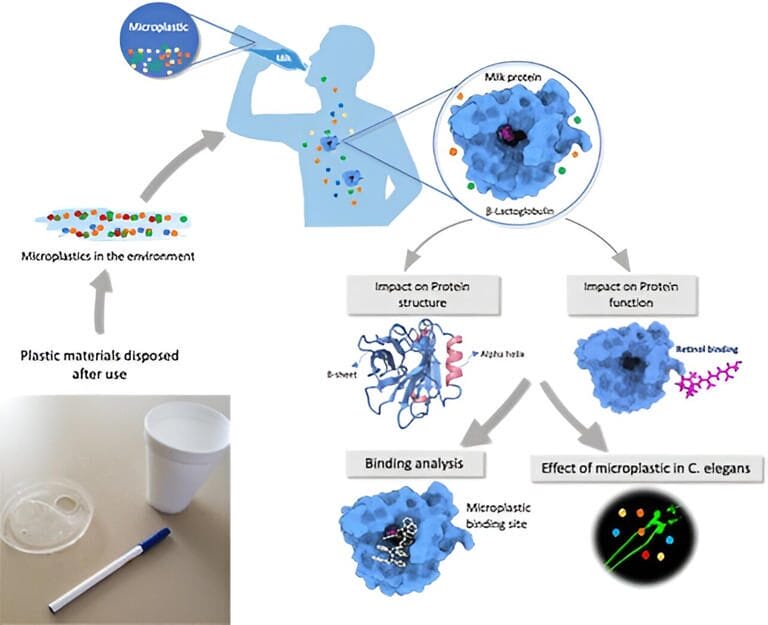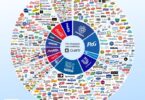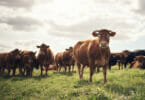The following report is by Phys.org:
Researchers at The University of Texas at El Paso have made significant inroads in understanding how nanoplastics and per- and polyfluoroalkyl substances (PFAS)—commonly known as forever chemicals—disrupt biomolecular structure and function. The work shows that the compounds can alter proteins found in human breast milk and infant formulas—potentially causing developmental issues downstream.
Nanoplastics and forever chemicals are manmade compounds present throughout the environment; a series of recent studies have linked them to numerous negative health outcomes. While nanoplastics originate primarily as a result of the degradation of larger plastic materials, like water bottles and food packaging, forever chemicals are found in various products like cookware and clothing.
The UTEP research team focused on the compounds’ impact on three proteins critical to human development and function: beta-lactoglobulin, alpha-lactalbumin and myoglobin. Their findings, which provide an atomic-level insight into the detrimental effects of nanoplastics and PFAS on human health, are described in two recent articles in the Journal of the American Chemical Society and ACS Applied Materials and Interfaces.
“By understanding the molecular mechanisms of how nanoplastics and forever chemicals disrupt cellular functions, scientists can develop safer alternatives to these materials,” said Mahesh Narayan, Ph.D., a professor, fellow of the Royal Society of Chemistry and chief of the Division of Biochemistry in UTEP’s Department of Chemistry and Biochemistry, who oversaw the two studies. “The insights gained from this research have far-reaching implications.”

Narayan said that, most importantly, their research revealed that nanoplastics and PFAS completely “dissolved” a region of proteins known as the alpha helix, converting them into structures called beta sheets.
“We weren’t expecting them all to have this similar impact on the alpha helix,” Narayan said. “It was a complete coincidence.” The team observed that this alteration also occurs in amyloid proteins, which can cause neurodegeneration and neurotoxic outcomes if the synthetic chemicals reach the brain.

Additional key findings of the studies are described below.
Milk Protein: Beta-Lactoglobulin (BLG)
BLG is a protein found in the milk of sheep and cows and is commonly used as an ingredient in infant formula. The protein binds to retinol (vitamin A) and fatty acids and is crucial for vision and brain development in infants.
The research team discovered that the binding efficiency of BLG to retinol and fatty acids decreases upon exposure to nanoplastics and PFAS. This decrease, modeled by Lela Vukovic, Ph.D., associate professor in the Department of Chemistry and Biochemistry, can lead to significant developmental issues in neonatal infants, the team said.
Additionally, for the first time ever, the team observed that PFAS binds to the milk protein, turning it into a carrier for these compounds.
Human Breast Milk: Alpha-Lactalbumin
Alpha-lactalbumin is found in human breast milk, participates in lactose synthesis and is ingested by infants to help meet nutritional needs. UTEP researchers found that nanoplastics and PFAS corrupt the structure of alpha-lactalbumin protein, thereby potentially compromising lactose formation. The team said the disruption can lead to downstream developmental defects in neonatal infants, such as compromised immunity and reduced mineral absorption.
Oxygen Storage: Myoglobin
Myoglobin, found in the blood and muscle tissue of most mammals, is crucial for storing oxygen. The UTEP research team found that nanoplastics and PFAS compromise the functionality of the myoglobin protein, disrupting its ability to store oxygen. This disruption could lead to health issues such as breathlessness and anemia.
Additional experiments by the team demonstrated that exposure to nanoplastics impairs locomotion in worms, with effects comparable to paraquat—an herbicide that has been tied to causing Parkinson’s disease.
This work has the potential to significantly impact public health and environmental policies, highlighting the vital role of scientific research in addressing global challenges.
Said Robert Kirken, Ph.D., dean of the College of Science.
“I am proud of the groundbreaking research conducted by Dr. Narayan, Dr. Vukovic and their teams. Their innovative approach to understanding how these manmade materials disrupt biomolecular functions is a prime example of the transformative work UTEP researchers do on a regular basis.”
Narayan and his research team plan to continue their studies and investigate the effects of other plastics and PFAS compounds.
AUTHOR COMMENTARY
It is important to remember that nanoplastics are smaller than microplastics, which would imply that the problem with ‘forever chemicals’ in the food and water supply is much worse than we know about. Only now is the literature starting to reach mainstream eyeballs.
SEE: Shock Study Reveals Bottled Water Contains An Average Of 240,000 Pieces Of Nanoplastics
Study Links Nanoplastics To Parkinson’s Disease And Other Types Of Dementia
The world was sold the lie about how great plastics and special coatings are, and all the things it would enable us to do, the money it save; but very little talk was made about health effects it have on us, animals, food and water, and environment. We were told to stop using paper bags and switch to plastic in order to save Hooty the Spotted Owl. And look at us now: the spotted owl is no better off and we are all drastically worse off…
Try your best, but use natural materials whenever you can to the best of your abilities in all things: cooking, cleaning, clothing, furniture, etc.
Proverbs 24:21 My son, fear thou the LORD and the king: and meddle not with them that are given to change: [22] For their calamity shall rise suddenly; and who knoweth the ruin of them both?
[7] Who goeth a warfare any time at his own charges? who planteth a vineyard, and eateth not of the fruit thereof? or who feedeth a flock, and eateth not of the milk of the flock? [8] Say I these things as a man? or saith not the law the same also? [9] For it is written in the law of Moses, Thou shalt not muzzle the mouth of the ox that treadeth out the corn. Doth God take care for oxen? [10] Or saith he it altogether for our sakes? For our sakes, no doubt, this is written: that he that ploweth should plow in hope; and that he that thresheth in hope should be partaker of his hope. (1 Corinthians 9:7-10).
The WinePress needs your support! If God has laid it on your heart to want to contribute, please prayerfully consider donating to this ministry. If you cannot gift a monetary donation, then please donate your fervent prayers to keep this ministry going! Thank you and may God bless you.








These environmentalist nitwits care more about Hootie the Spotted Owl and Hootie the Blowfish than they do about our own health.
Worse yet: people care more about Hootie the Spotted Owl, the whales, the trees, and the rainforest than they do about an innocent unborn baby who is torturously murdered by abortion!
What is wrong with that picture?